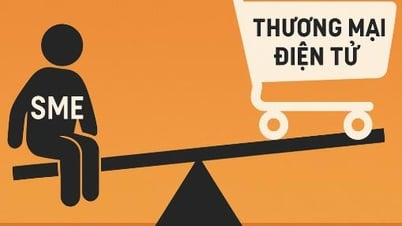Concerns of domestic enterprises
According to information from Momentum Works Market Research Company, the popular low-cost e-commerce platform Temu from China is about to launch in Vietnam. Although the Temu Vietnam website is still very rudimentary, only in English (no Vietnamese); products are displayed in VND; there are only 2 shipping service providers, Ninja Van and Best Express;... But this shows that the Vietnamese e-commerce market is creating fierce competition, especially almost dominated by foreign trading platforms.
 |
| A series of foreign e-commerce platforms dominate the Vietnamese market. Photo: baochinhphu.vn |
Thus, up to the present time, e-commerce in Vietnam is almost dominated by foreign platforms, mainly from China. For example, Shopee belongs to SEA Limited Group - a multinational technology corporation headquartered in Singapore, but its largest shareholder is Tencent from China; TikTok Shop is owned by ByteDance (China); Lazada is owned by Alibaba Group (China). In particular, Shopee, TikTok Shop, Lazada alone have dominated the domestic market, with the total value of goods dominating more than 90%.
In addition to the above e-commerce platforms, two other low-cost Chinese e-commerce sites, Taobao and 1688, have also made moves to approach the Asian market, including Vietnam.
Specifically, 1688.com - a platform under Alibaba Group that mainly serves domestic customers, has suddenly added Vietnamese language on the iOS version and supports delivery to users' addresses in Vietnam. Previously, this application was only available in Chinese.
As for the Taobao application, it does not yet support Vietnamese, but it allows shipping to users' addresses in Vietnam. Regarding shipping fees, the online retail giant applies a free domestic shipping policy and charges a fee for shipping to Vietnam.
Momentum Works' Southeast Asia E-commerce 2024 report highlights that Vietnam is the fastest growing e-commerce market by 2023, with a gross merchandise value growth rate of nearly 53%. However, the fact that many Chinese e-commerce platforms are providing goods at super cheap prices to the Vietnamese market signals many difficulties for domestic manufacturing enterprises, especially small and medium-sized manufacturing enterprises.
Need policy to develop manufacturing industry
Sharing about this issue, Associate Professor Dr. Dinh Trong Thinh, senior lecturer at the Academy of Finance, said that the participation of Chinese e-commerce platforms in the Vietnamese market will greatly affect domestic production and business. Cheap foreign goods make domestic goods uncompetitive, even leading to many businesses going bankrupt.
 |
| Temu is about to launch in the Vietnamese market. Photo: cafebiz.vn |
Analyzing one of the reasons why Chinese goods are popular in the Vietnamese market, Associate Professor, Dr. Dinh Trong Thinh said: Currently, Vietnam still applies the tax exemption regulation for imported goods with a value of less than 1 million VND, but e-commerce goods or imported sugar are mainly of small value, so these items are naturally exempted from tax.
Associate Professor, Dr. Dinh Trong Thinh also said that there are currently hundreds of Chinese warehouses ready to send goods to Vietnam at the border, combined with the fact that major Chinese e-commerce platforms have also entered the Vietnamese market, making it very difficult for Vietnamese businesses to breathe.
“Therefore, of course, e-commerce platforms that provide cheap goods will squeeze domestic manufacturing enterprises. They are exempted from taxes and import fees, sell at cheaper prices, and have diverse designs, so they can easily dominate the Vietnamese market,” Associate Professor, Dr. Dinh Trong Thinh emphasized.
Associate Professor, Dr. Dinh Trong Thinh said that it is time to amend the Law in the direction that all goods entering and leaving the country must pay taxes to ensure fair and equal competition so that the competitive conditions of domestic enterprises are clearer.
On the other hand, Associate Professor, Dr. Dinh Trong Thinh emphasized, “ To be fair, we must compete fairly. It depends on the determination and initiative of Vietnamese enterprises. They have an advantage in transportation costs, so if they want to survive and develop, they must apply technology, reduce operating costs; or organize promotional and after-sales activities, improve product designs and quality, and attract consumers to increase competitiveness.”
According to Dr. Le Dang Doanh - former Director of the Central Institute for Economic Management, many Chinese e-commerce platforms entering the Vietnamese market is a real challenge for domestic enterprises, and we may not be well prepared for this development.
If this situation continues, many Vietnamese products will not be competitive enough. Chinese goods will even flood the Vietnamese market, Vietnamese traders will import Chinese goods to do business, while domestic products will be sluggish and unsold.
According to Dr. Le Dang Doanh, state agencies need to seriously consider regulations and strictly manage imported goods or goods received from electronic orders regarding tax legality as well as avoid counterfeit goods, fake goods, and cheap tax-evading goods from flooding in. In addition, it is necessary to study why Chinese goods are cheap, are they subsidized or not? From there, find appropriate solutions to promote the development of Vietnam's manufacturing industry.
On the contrary, Vietnamese enterprises should also make more efforts to find ways to improve production productivity and product quality, and even bring their strengths, especially Vietnamese fruits such as durian, mango, longan, jackfruit, etc., directly to the Chinese people, just like the Chinese bring goods directly to the Vietnamese people.
According to Reuters, Indonesia - Southeast Asia's largest e-commerce market has recently asked Google and Apple to block the Chinese app Temu from their app stores in the country. The move is aimed at protecting small and medium-sized businesses in the country from the wave of super-cheap products from Temu. Mr. Budi Arie Setiadi, Minister of Information and Communications of Indonesia, said that the fact that this platform allows consumers to connect directly with factories in China to sharply reduce prices is a form of unfair competition. "We are not protecting the e-commerce industry, we are protecting small and medium enterprises. There are millions of businesses in Indonesia that need to be protected right now," the Indonesian Minister of Information and Communications emphasized. In addition, the Indonesian government is also planning to request a similar ban on China's Shein shopping service. Last year, Indonesia forced TikTok to shut down its e-commerce service to protect merchants and user data. A few months later, TikTok acquired a majority stake in the e-commerce unit of Indonesian tech giant GoTo Group to stay afloat. |
Source: https://congthuong.vn/san-thuong-mai-dien-tu-dua-hang-gia-re-vao-thi-truong-viet-nam-doanh-nghiep-trong-nuoc-can-lam-gi-353194.html







![[Photo] Nearly 3,000 students moved by stories about soldiers](https://vphoto.vietnam.vn/thumb/1200x675/vietnam/resource/IMAGE/2025/5/17/21da57c8241e42438b423eaa37215e0e)



































































































Comment (0)